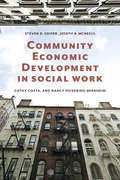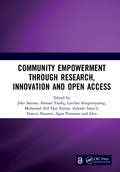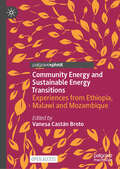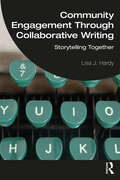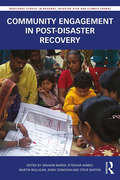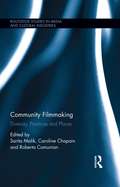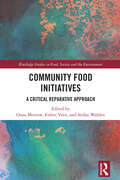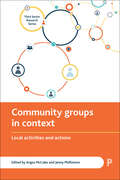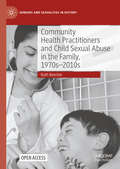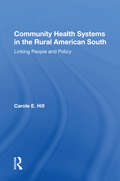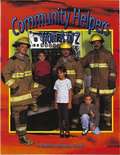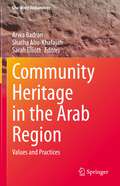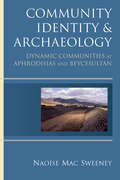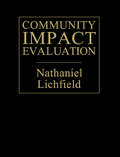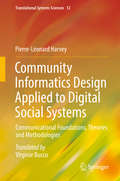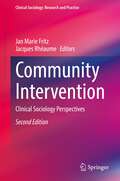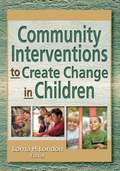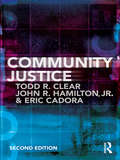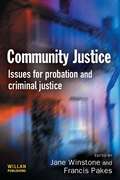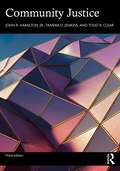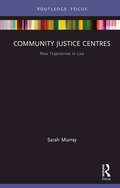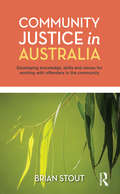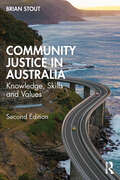- Table View
- List View
Community Economic Development in Social Work
by Cathy Nancy Steven D. Soifer Mcneely Joseph B. Costa Pickering-BernheimThis cutting-edge text explores the intersection of CED and social work practice
Community Economic Development in Social Work
by Cathy Costa Joseph B. Mcneely Nancy Pickering-Bernheim Steven D. SoiferThis cutting-edge text explores the intersection of CED and social work practice
Community Economic Development in Social Work (Foundations of Social Work Knowledge Series)
by Cathy Costa Nancy Pickering-Bernheim Steven Soifer Joseph McNeelyCommunity economic development (CED) is an increasingly essential factor in the revitalization of low- to moderate-income communities. This cutting-edge text explores the intersection of CED and social work practice, which both focus on the well-being of indigent communities and the empowerment of individuals and the communities in which they live. This unique textbook emphasizes a holistic approach to community building that combines business and real-estate development with a focus on stimulating family self-reliance and community empowerment. The result is an innovative approach to rehabilitating communities in decline while preserving resident demographics. The authors delve deep into the social, political, human, and financial capital involved in effecting change and how race and regional issues can complicate approaches and outcomes. Throughout, they integrate case examples to illustrate their strategies and conclude with a consideration of the critical role social workers can play in developing CED's next phase.
Community Empowerment through Research, Innovation and Open Access: Proceedings of the 3rd International Conference on Humanities and Social Sciences (ICHSS 2020), Malang, Indonesia, 28 October 2020
by Joko SayonoICHSS is an international seminar that is held every two years organized by the Research and Community Service Institute of the State University of Malang. The meeting aims to discuss the theoretical and practical developments of Social Sciences and Humanities in Indonesia and other countries with a view to build academic networks by gathering academics from various research institutes and universities.Community empowerment serves as a trigger to increase community independence and to cope with the challenges resulting from the rapid development of technology. An important aspect of the community empowerment effort is to link the results of innovation research for the benefit of community. The results of research should not only be limited to publications in the academic environment. Open Access to various forms of the existing literature is one of the requirements for innovative research to develop optimally. Therefore, this seminar has also served as a place for field researchers from various geographical areas to socialize, to discuss and to find solutions to current issues in the field of social sciences and humanities, as well as to build cooperation and synergy in creating ideas for mutual collaboration and to create joint research.
Community Energy and Sustainable Energy Transitions: Experiences from Ethiopia, Malawi and Mozambique
by Vanesa Castán BrotoThis open access book engages with the difficulties of delivering community energy in practice, building on practical experiences in Ethiopia, Malawi, and Mozambique. In these countries, where many people lack access to electricity, community energy is an alternative to advance universal energy access. This book argues that, besides providing access, community energy is essential for achieving justice and resilience in sustainable energy transitions. Community energy combines off-grid infrastructures with innovative forms of governance to incorporate the perspectives of beneficiaries in the generation and distribution of electricity. Community energy has multiple benefits for communities, such as facilitating the adoption of renewable technologies, providing energy access where it is lacking, and building resilience. They also offer societal benefits beyond beneficiary communities, such as providing additional capacity to existing grids, delivering off-grid services where the grid is absent, and bridging on-grid and off-grid systems. Despite its promises, however, the adoption of community energy has been slow. This book presents a feminist-informed perspective on community energy to advance energy justice that puts disadvantaged communities at the centre of sustainable energy transitions. It also explores the room for manoeuvre within existing regulatory systems, supply chains, and delivery systems to facilitate its development. By engaging with existing experiences in community energy, the book demonstrates the potential of communities to gain control over their energy needs and resources and argues for the need to develop a wide range of transdisciplinary skills among policymakers, technicians and communities to deliver a just energy transition.
Community Engagement Through Collaborative Writing: Storytelling Together
by Lisa J. HardyCommunity Engagement Through Collaborative Writing: Storytelling Together is designed to support scholars and communities storytelling together to reach multiple audiences and facilitate social change. Social scientists, public health practitioners, community leaders, and others recognize that there can be no forward movement in addressing the problems and inequalities facing the world today without collaboration across interdisciplinary, multisectoral, geographic, and socioeconomic divides. The book uses real-world experiences to guide individuals and groups through a process of identifying the knowledge they have and sharing that knowledge through various genres. This process includes identifying and honoring different forms of knowledge, not just academic research and training. Combining the principles of trust and collaboration with practical tools, the chapters contain discussions, examples, and instruments for working together across divides toward a common goal of telling stories together. Community Engagement Through Collaborative Writing: Storytelling Together is a valuable resource for applied anthropologists and other social scientists doing community-engaged work for research methods courses and for fields such as public health and education.
Community Engagement in Post-Disaster Recovery (Routledge Studies in Hazards, Disaster Risk and Climate Change)
by Martin Mulligan Steve Barton Graham Marsh Iftekhar Ahmed Jenny Donovan AndCommunity Engagement in Post-Disaster Recovery reflects a wide array of practical experiences in working with disaster-affected communities internationally. It demonstrates that widely held assumptions about the benefits of community consultation and engagement in disaster recovery work need to be examined more critically because poorly conceived and hastily implemented community engagement strategies have sometimes exacerbated divisions within affected communities and/or resulted in ineffective use of aid funding. It is equally demonstrated that well-crafted, creative and thoughtful programming is possible. The wide collection of case studies of practical experience from around the world is presented to help establish ways of working with communities experiencing great challenges. The book offers practical suggestions on how to give more substance to the rhetoric of community consultation and engagement in these areas of work. It suggests the need to work with a dynamic understanding of community formation that is particularly relevant when people experience unforeseen challenges and traumatic experiences. This title interrogates the concept of community through an extensive review of the literature and explores the ways of working with communities in transition and particularly in their recovery phases through an array of case studies in a range of socioeconomic and political contexts. Focused on the concept of community in post-disaster recovery solutions—an aspect which has received little critical interrogation in the literature—this book will be a valuable resource to students and scholars in disaster management as well as humanitarian agencies.
Community Filmmaking: Diversity, Practices and Places (Routledge Studies in Media and Cultural Industries)
by Sarita Malik Caroline Chapain Roberta ComunianThis book examines the role of community filmmaking in society and its connection with issues of cultural diversity, innovation, policy and practice in various places. Deploying a range of examples from Europe, North America, Australia and Hong Kong, the chapters show that film emerging from outside the mainstream film industries and within community contexts can lead to innovation in terms of both content and processes and a better representation of the cultural diversity of a range of communities and places. The book aims to situate the community filmmaker as the central node in the complex network of relationships between diverse communities, funding bodies, policy and the film industries.
Community Food Initiatives: A Critical Reparative Approach (Routledge Studies in Food, Society and the Environment)
by Stefan Wahlen Oona Morrow Esther VeenThis book examines a diverse range of community food initiatives in light of their everyday practices, innovations, and contestations. While community food initiatives aim to tackle issues like food security, food waste, or food poverty, it is a cause for concern for many when they are framed as the next big "solution" to the problems of the current industrialised food system. They have been critiqued for being too neoliberal, elitist, and localist; for not challenging structural inequalities (e.g. racism, privilege, exclusion, colonialism, capitalism); and for reproducing these inequalities within their own contexts. This edited volume examines the everyday realities of community food initiatives, focusing on both their hopes and their troubles, their limitations and failures, but also their best intentions, missions, and models, alongside their capacity to create hope in difficult times. The stories presented in this book are grounded in contemporary theoretical debates on neoliberalism, diverse economies, food justice, community and inclusion, and social innovation, and help to sharpen these as conceptual tools for interrogating community food initiatives as sites of both hope and trouble. The novelty of this volume is its focus on the everyday doings of these initiatives in particular places and contexts, with different constraints and opportunities. This grounded, relational, and place-based approach allows us to move beyond more traditional framings in which community food initiatives are either applauded for their potential or criticized for their limitations. It enables researchers and practitioners to explore how community food initiatives can realize their potential for creating alternative food futures and generates innovative pathways for theorising the mutual interplay of food production and consumption. This volume will be of great interest to students and scholars of critical food studies, food security, public health, and nutrition as well as human geographers, sociologists, and anthropologists with an interest in food.
Community Groups in Context: Local Activities and Actions (Third Sector Research Series)
by Angus McCabe & Jenny PhillimoreIn the past decade community groups have been portrayed as the solution to many social problems. Yet the role of ‘below the regulatory radar’ community action has received little research attention and thus is poorly understood in terms of both policy and practice. Focusing on self-organised community activity, this book offers the first collection of papers developing theoretical and empirically grounded knowledge of the informal, unregistered, yet largest, part of the voluntary sector. The collection includes work from leading academics, activists, policy makers and practitioners offering a new and coherent understanding of community action ‘below the radar’. The book is part of the Third Sector Research Series which is informed by research undertaken at the Third Sector Research Centre, funded by the Economic and Social Research Council and Barrow Cadbury Trust.
Community Health Practitioners and Child Sexual Abuse in the Family, 1970s-2010s (Genders and Sexualities in History)
by Ruth BeecherThis open access book is an innovative history of community health practitioners’ responses to the seemingly intractable problem of men (and on rare occasions, women) sexually abusing children within the private family home. It is situated within a social history of the development of British community-based health professions in the last decades of the twentieth century. Drawing on archival research and newly gathered in-depth oral history interviews, the monograph argues that expectations placed upon community-based doctors, nurses and mental health staff since the 1980s in relation to predicting and preventing the sexual abuse of children by men they know are incongruous. Beneath a surface acquiescence to the need to protect children from such abuse or to intervene early lie cultural, social and structural barriers that prevent its fulfilment. The book is a first in specifically interrogating the recent history of the role of community health practitioners within the modern 'child protection workforce', and contributes to growing scholarship on the history of emotions in the medical professions.
Community Health Systems In The Rural American South: Linking People And Policy
by Carole E HillA cultural perspective of health care systems can provide health care providers and policymakers with a broader understanding of the issues they face when planning and implementing new health programs in communities. Healthcare tales place in a community setting while health care policy is developed at an entirely different level in the larger socioeconomic system. In this study the author attempts to link the community level systems of health with those of the policy level system and allow for a comparison of the convergence and divergence of people's health beliefs and behavior with those of policymakers and of medical anthropology in Coberly.
Community Helpers From A To Z (Alphabasics)
by Bobbie KalmanLavishly illustrated with artwork and amazing photographs, Alphabasics are a combination of ABC books and picture dictionaries. Each book names an object for each letter and gives fascinating information on topics that are fresh and appealing to children. <p><p> Let's meet people who make our communities cleaner, safer, more pleasant places to live. Full-color photographs and illustrations with informative captions feature workers performing tasks related to their occupations putting their various roles into a context children will recognize. This alphabet book introduces young readers to a range of community helpers.
Community Heritage in the Arab Region: Values and Practices (One World Archaeology)
by Sarah Elliott Arwa Badran Shatha Abu-KhafajahThis book investigates approaches to community heritage within the Arab region and the underlying theories associated with these approaches. It aims, within the context of the region, to define ‘community’ and ‘heritage’, as well as examine the emergence and development of this field. The volume’s contributors deploy a wealth of case studies from the Middle East and North Africa to provide a unique forum for discussion, comparability, analysis and deeper understandings of current trends in community heritage. In particular, the volume explores the relationship between communities and their heritage, the meanings and values placed upon it, the nature and degree of community participation and engagement in its interpretation and management, and how its different registers affect and produce sometimes unexpected community heritage formations. It also examines the level of responsibility held within the profession towards this essentially democratic process of public participation in their heritage in a region shaped by controversial histories, political turmoil and tourism-driven economies. The volume builds on current research and practice in community heritage globally by debating and re-centring a suite of familiar and new issues related to hitherto under-researched regional-specific methodologies, and developing fresh insight into the theoretical underpinning of these practices. It will be of value to heritage scholars and practitioners as well as those interested in politics, identity, education and the dynamics of heritage-based sustainable development.
Community Identity and Archaeology: Dynamic Communities at Aphrodisias and Beycesultan
by Naoise Mac SweeneyCommunity Identity and Archaeology explores the concept of community identity and its application in archaeology, using the modern Turkish sites of Aphrodisias and Beycesultan as case studies to illustrate the formation and dissolution of communities over time. The concept of the community is vital to the way we understand human societies both past and present, and the last decade has seen widespread interest in communities from both the popular and academic spheres. The concept is also central to archaeology, where the relationship between sites and communities remains controversial. Naoíse Mac Sweeney aims to take the debate one step further, setting out a comprehensive framework for the archaeological investigation of community identity, encompassing theoretical approaches for its conceptualization, practical methodologies for its investigation, and detailed case studies in Anatolia to test and illustrate its arguments. This book contributes to discussions in archaeological theory and material culture studies and is particularly relevant to archaeologists working on different types of cultural identity. Community Identity and Archaeology's readership will include undergraduate and graduate students as well as academic specialists. In addition, the book contains material of direct historical interest for Classics and Near Eastern departments. It includes valuable new research relevant for those working on Aegean, Mycenaean, or Early Greek antiquity, as well as specialists in Anatolia including scholars working on the Hittite, Phrygian, and Lydian empires.
Community Impact Evaluation: Principles And Practice
by Nathaniel LichfieldThis is a work summarizing in one volume the pioneering approach of the author to public-interest decision-taking in the field of urban & regional planning. This book is aimed at students, researchers and professionals in planning. Nathaniel Lichfield first introduced in his "Economics of Planned Development" the concept that, in any use and development of land, the traditional "development balance sheet" of the developers needed to be accompanied by a "planning balance sheet" prepared by the planning officer or planning authority. Over the forty years since this work was published, the author has brought to the operational level the "planning balance sheet", with many case studies, primarily for consultancy purposes. The present title reflects the incorporation during the 1970s of the then emerging field of environmental impact assessment.
Community Informatics Design Applied to Digital Social Systems
by Pierre-Léonard Harvey Virginie BuccoThis book introduces a Digital Social System Praxis Framework (DSSPF) integrating Computational Media, Evolutionary Systems Thinking and Design Thinking approaches to E-transformation practice, also called Community Informatics Design (CID). The DSSPF framework is intended to create communication spaces dedicated to knowledge production and sharing for social and organizational change. It allows social systems researchers and practitioners to recognize their synergistic roles in the praxis process to shape their future through social innovation projects. This transdisciplinary text provides potential students and practitioners fundamental concepts and tools for such design. It offers resources from the Pragmatic and Systemic philosophy of science for the co-construction of social architectures and infrastructures, and multi-aspectual design methodologies by which government, organizations and civil society can learn to ethically co-design common ground. This approach provides complementary and common patterns from known methods, models, and theories of social systems interventions that could support a generic framing of large scale sociotechnical systems: digital social innovation ecosystem, living Labs, Fab Labs, enterprise collaborative networks.There will be a particular focus on understanding and addressing the dimensions that make people from different communities of practice able to communicate and collaborate through multiple digital media, design platforms, worldviews and modeling approaches.
Community Intervention: Clinical Sociology Perspectives (Clinical Sociology: Research and Practice)
by Jan Marie Fritz Jacques RhéaumeThe second and expanded edition of this award-winning book provides the most up-to-date and important efforts for improving the quality of life in communities around the world. It focuses on community improvements in relation to the interdisciplinary field of clinical sociology. The first part of the book includes updated analyses of important concepts and tools for community intervention. It discusses the importance of centrally involving community members in all phases of community development activities. Part II includes several completely new chapters and focuses on projects in a number of countries -- the United States, Brazil, South Africa, Canada, the Philippines and France. It covers topics such as establishing human rights cities; involving and empowering local communities; research in communities; the healthy cities movement; and climate change. This edition includes several new gender-focused chapters, addressing local level initiatives based on the recommendations of the Committee on the Elimination and Discrimination Against Women (CEDAW), women in prison, and gender factors in climate risk. The appendices include profiles of outstanding practitioners and scholar-practitioners over the last 100 years. This edition includes contributions from well-known scholars and practitioners in clinical sociology and is of interest to sociologists, social policy makers, social workers, and sustainability researchers. The first edition of this book received the Distinguished Scholarly Book Award from the Clinical Sociology Division of the International Sociological Association.
Community Interventions to Create Change in Children
by Lorna LondonHelp a child meet the challenges of the "real" world! Our children spend a significant amount of time in school, working to develop the skills they need to succeed in the "real" world. But more and more, they face social and emotional challenges that can't be effectively addressed during school hours. Community Interventions to Create Change in Children reflects the efforts by psychologists to work outside the classroom, combining research with action to produce community-based interventions that address the concerns children struggle with every day: bullying and victimization, prejudice, cross-cultural friendships, poverty, and homelessness. Community Interventions to Create Change in Children presents varied interventions, methodologies, and practices with diverse groups of children. Qualitative and quantitative methodologies are used with accompanying case studies as psychologists interact with children in settings as varied as public parks, summer camps, and Kid's College, a Chicago-based program that promotes positive race relations. The book includes articles on: effective mentoring practices traditional behavioral reinforcement with homeless children survival skills for urban youth cross-cultural friendships prejudicial attitudes and behaviors and much more! Community Interventions to Create Change in Children is an essential resource for psychologists, educators, counselors, and social workers committed to making a difference in the lives of children.
Community Justice
by Eric Cadora John R Hamilton Jr. Todd R ClearCommunity Justice discusses concepts of community within the context of justice policy and programs, and addresses the important relationship between the criminal justice system and the community in the USA. Taking a bold stance in the criminal justice debate, this book argues that crime management is more effective through the use of informal (as opposed to formal) social control. It demonstrates how an increasing number of criminal justice elements are beginning to understand that the development of partnerships within the community that enhance informal social control will lead to a stabilization and possible a decline in crime, especially violent crime, and make communities more liveable. Borrowing from an eclectic toolbox of ideas and strategies - community organizing, environmental crime prevention, private-public partnerships, justice initiatives - Community Justice puts forward a new approach to establishing safe communities, and highlights the failure of the current American justice system in its lack of vision and misuse of resources. Providing detailed information about how community justice fits within each area of the criminal justice system, and including relevant case studies to exemplify this philosophy in action, this book is essential reading for undergraduate and postgraduate students of subjects such as criminology, law and sociology.
Community Justice
by Francis Pakes Jane WinstoneThis book provides and accessible text and critical analysis of the concepts and delivery of community justice, a focal point in contemporary criminal justice. The probation service in particular has undergone radical changes in relation to professional training, roles and delivery of services, but now operates within a mosaic of a number of inter-agency initiatives. This book aims to provide a critical appreciation of community justice, its origin and direction, and to engage with debates on the ways in which the trend towards community justice is changing the criminal justice system. At the same time it examines the inter-agency character of intervention and the developing idea of end-to-end offender management, and familiarises the reader with a number of more specialist area, such as hate crime, mental illness, substance abuse, and victims.
Community Justice
by Todd R. Clear John R. Hamilton Jr. Tamera D. JenkinsCommunity Justice discusses concepts of community within the context of justice policy and programs and addresses the important relationship between the criminal justice system and the community in the USA.Taking a bold stance in the criminal justice debate, this book argues that crime management is more effective through the use of informal (as opposed to formal) social control. It demonstrates how an increasing number of criminal justice elements are beginning to understand that developing partnerships within the community that enhance informal social control will lead to stabilization and possibly a decline in crime, especially violent crime, and make communities more livable. Borrowing from an eclectic toolbox of ideas and strategies – community organizing, environmental crime prevention, private–public partnerships, and justice initiatives – Community Justice puts forward a new approach to establishing safe communities and highlights the failure of the current American justice system in its lack of vision and misuse of resources.This book is essential for undergraduate and postgraduate students of criminology, law, and sociology. It provides detailed information about how community justice fits within each area of the criminal justice system and includes relevant case studies to exemplify this philosophy in action.
Community Justice Centres: New Trajectories in Law (New Trajectories in Law)
by Sarah MurrayThis book examines the phenomenon of Community Justice Centres and their potential to transform the justice landscape by tackling the underlying causes of crime. Marred by recidivism, addiction, family violence, overflowing courtrooms, crippling prison spending and extreme rates of incarceration, the criminal justice system is in crisis. Community Justice Centres seek to combat this by tackling the underlying causes of crime in a particular neighbourhood and working with local people to redesign the experience of justice and enhance the notion of community. A Community Justice Centre houses a court which works with an interdisciplinary team to address the causes of criminality such as drug addiction, cognitive impairment, mental illness, poverty, abuse and intergenerational trauma. The community thus becomes a key agent of change, partnering with the Centre to tackle local issues and improve safety and community cohesion. This book, based on research into this innovative justice model, examines case studies from around the world, the challenges presented by the model and the potential for bringing its learnings into the mainstream. This book will appeal to academics in law and criminology as well as psychology; it will also be of considerable interest to people working in the criminal justice system, including the police, government policy advisers, psychologists and social workers.
Community Justice in Australia: Developing knowledge, skills and values for working with offenders in the community
by Brian Stout'An effective interweaving of complex theory with mainstream concepts. Overall an excellent book for use in Australian universities teaching criminology/social work.' Dr Jane Bolitho, Lecturer, Criminology and Social Sciences, UNSWThe concept of community justice - of engaging with offenders within the community - offers an important new approach to the prevention of crime and the rehabilitation of offenders. Community Justice in Australia is the first text to consider how this concept can be successfully applied within Australia by social workers, criminologists, parole officers, police and anyone working with both adult and youth offenders.Brian Stout begins by defining community justice and outlining its successes in the United Kingdom and the United States. He then explains theories of offending behaviour, considers relevant Australian legislation, policy and common intervention strategies, and considers the implications of community justice approaches for both adult and juvenile offenders. Restorative justice is also examined and contrasted.The book's second half details practice issues including working in community justice organisations, the use of technology, and the need for community justice workers to co-create long-term change with their clients. The importance of risk management and protection of the public is explored together with a comprehensive guide to practice skills and working with involuntary clients. Each chapter also contains a detailed analysis of the implications and potential benefits of a community justice approach for culturally diverse groups and Indigenous people.
Community Justice in Australia: Knowledge, Skills and Values
by Brian StoutThis new edition of Community Justice in Australia expands on the discussion of how people who have committed offences can be engaged in the community. It considers how the concept of community justice can be successfully applied within Australia by social workers, criminologists, parole officers and anyone working in the community with both adults and young people. The book defines community justice and applies the concept to the Australian context. It then explains theories of offending behaviour, considers relevant Australian legislation, policy and intervention strategies and examines the implications for both young people and adults. Restorative justice is also discussed. The latter part of the book focuses on practical issues including working in community justice organisations, technology, public protection and desistance approaches. Each chapter contains an engagement with the implications of community justice approaches for Indigenous groups and features reflective questions, practical tasks and guidance for further reading. This accessible and practical book will be indispensable for instructors, students and practitioners working in the community with people who have committed offences.
